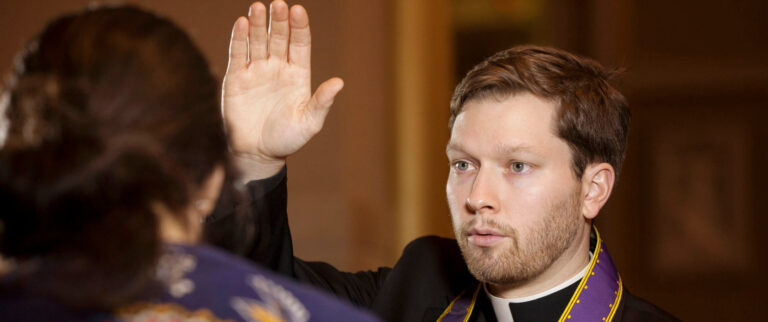Q. Could a person go to daily Mass and receive Communion without having gone to confession in four years? (Batesville, Indiana)
A. The answer, technically, is yes. If the person had committed no serious (mortal) sins over that four-year period, he or she could go to Mass and receive Communion every day. Strictly speaking, the obligation of annual confession applies only to those in serious sin.
The church’s Code of Canon Law reads this way: “After having reached the age of discretion, each member of the faithful is obliged to confess faithfully his or her grave sins at least once a year” (Canon 989). (Canon 916 explains that anyone who is conscious of grave sin may not receive the Eucharist without first having gone to confession.)
But is it a good idea for Catholics to stay away from confession for four years, even if they have no mortal sins to confess? Of course not. Over and over, spiritual writers encourage the faithful to use the sacrament of penance regularly, perhaps even monthly, as a path not only to pardon, but to spiritual progress and inner peace.
Canon 988.2 says, “It is recommended to the Christian faithful that they also confess venial sins,” and the introduction to the church’s rite of penance says, “Frequent and careful celebration of this sacrament is also very useful as a remedy for venial sins. This is not a mere ritual repetition or psychological exercise, but a serious striving to perfect the grace of baptism so that … his (Christ’s) life may be seen in us ever more clearly” (No. 7b).
Shortly after he was elected pope, at a weekly audience in November 2013, Pope Francis revealed that he himself receives the sacrament of penance every two weeks and considers it to be the best path to spiritual healing and health. “We all need this,” the pope said.
Q. We have a very small congregation that has lost numerous families over the past few years. Our problem is this: Our priest is from Uganda; he is a good person, but it is nearly impossible to understand his English. He has been offered diction training but has refused.
The bits and pieces of his homily that I do understand seem to have little continuity or message. Yet he speaks for 20 or 25 minutes, while the congregation just looks around at one another. (He is nearing retirement age, but I fear we will have lost still more families by then.)
How can the church continue to mandate Sunday Mass attendance when good Catholics come away wondering and confused? (I realize there is a shortage of priests, but couldn’t a deacon or a visiting priest throw us a lifeline to keep our parish afloat?) (Virginia)
One course of action might be to present your concerns to a member of your parish council. If that doesn’t work, an alternative would be to round up a couple of other parishioners who feel the way you do and to seek an appointment with your diocesan bishop or his representative (perhaps the vicar general).
Explain to him the sharp drop in Mass attendance, the result being that some Catholics might be going to other parishes, if at all. Come to that meeting with a solution to propose — perhaps the assignment of a deacon to share some of the preaching.
But meanwhile be grateful that, with the priest shortage in America, many clergy from other countries have stepped in to help. Without them, there would almost certainly be more parishes in the U.S. without the celebration of the Eucharist every weekend. And as regards the Sunday Mass obligation, thankfully the homily is not your only source of spiritual nourishment. Even more, your strength for daily living comes from receiving Christ in Communion.
Copyright ©2018 Catholic News Service/U.S. Conference of Catholic Bishops.


